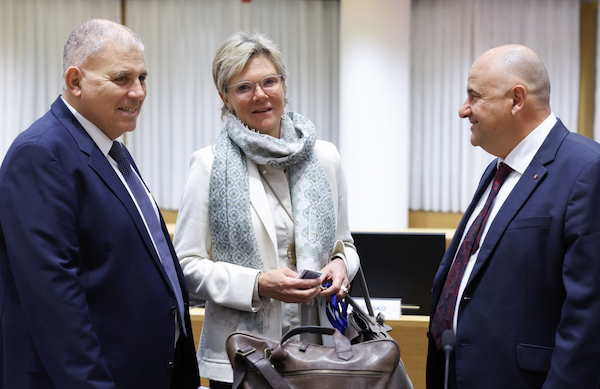 (L-R) Anton Refalo, Malta's Minister for Agriculture, Fisheries, Food and Animal Rights; Martine Hansen, Luxembourg’s Minister of Agriculture, Food and Viticulture; Konstantinos Tsiaras, Greek Minister of Rural Development and Food;
Credit: EU
(L-R) Anton Refalo, Malta's Minister for Agriculture, Fisheries, Food and Animal Rights; Martine Hansen, Luxembourg’s Minister of Agriculture, Food and Viticulture; Konstantinos Tsiaras, Greek Minister of Rural Development and Food;
Credit: EU
On Monday 24 February 2025, Luxembourg’s Minister of Agriculture, Food and Viticulture, Martine Hansen, took part in the European Union’s Agriculture and Fisheries Council meeting in Brussels.
According to the press release, Minister Hansen engaged with her European counterparts on the vision for agriculture and food policy presented by Christoph Hansen, the newly appointed European Commissioner for Agriculture.
"I welcome the new holistic approach that highlights the strategic role of food sovereignty for the European Union and places our farmers back at the centre of the Common Agricultural Policy (CAP). Some of the priorities outlined are particularly important for Luxembourg, namely: a generational renewal strategy, an incentive-based approach that motivates farmers to achieve environmental and climate objectives, the protection of European farmers against unfair competition and the simplification of procedures based on the principle of ‘collect once, use multiple times.’ Finally, to support agriculture in the years ahead, the CAP budget must remain sufficient to meet the challenges we face," stated Minister Hansen.
As reported by Luxembourg’s Ministry of Agriculture, Food and Viticulture, Minister Hansen also hopes to make rapid progress on issues related to pesticide use, residues and the development of bio-pesticides in agriculture: "This is a priority as we must protect both consumer interests and those of our farmers who wish to produce under fair conditions." She also welcomed the Commission’s intention to impose European production standards on imported agricultural products, particularly regarding pesticide residues and animal welfare.
The Council discussed the "rural test", a practice aimed at reassessing policies from the perspective of rural areas and better integrating their development into EU strategies and funding. Given Luxembourg’s specific characteristics and the close proximity of rural and urban areas, Minister Hansen has advocated for an approach without additional administrative burden, citing the successful LEADER rural development initiative as an example.
According to the press release, the ministers also analysed agricultural markets in light of the current situation in Ukraine. While markets remain relatively stable, "the perception among our farmers, impacted by bluetongue disease and political instability, is one of insecurity," said Minister Hansen. She concluded: "We need better cooperation in making vaccines available. I therefore welcome the Commission’s focus on the livestock sector in its vision for agriculture and food."
IK








